ARTICLE AD BOX

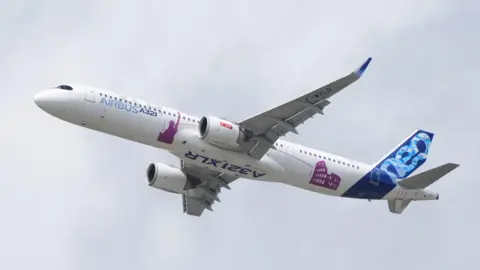 PA Media
PA Media
Airbus has sold 139 jets at the airshow, but admits long delays in making them
Airbus, the global aircraft manufacturer, has admitted the company is falling behind on its orders.
Guillaume Faury, the company’s chief executive officer, said there are “bottlenecks” in the supply chain.
“We have more demand than the ability to supply,” he said.
Mr Faury was speaking at the Farnborough International Airshow, the biggest gathering of aviation professionals of the year. Airbus has major bases in the UK just outside of Bristol and in Broughton.

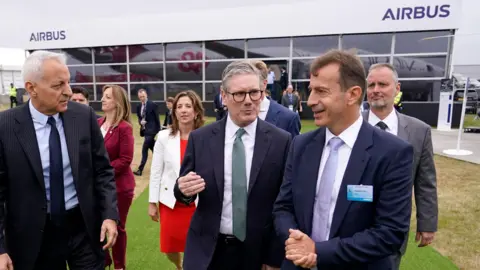 PA Media
PA Media
Sir Keir Starmer, the Prime Minister, speaks to Airbus CEO Guillaume Faury (right)
There are civilian airlines and military jet pilots. Technologists showing the latest kit and environmentalists trying to make flying greener.
The new British Prime Minister, Sir Keir Starmer, turned up. He made a speech, and met the Airbus CEO.
For the UK government, aviation is an important industry.
Every Airbus plane flies on wings designed by 3,000 engineers at Filton, near Bristol. The centre also designs and tests landing gear and fuel systems, and manufactures some wing components.
The wings are then completed at Broughton, Flintshire, where another 6,000 people work. Thousands more work for small firms in the supply chain.

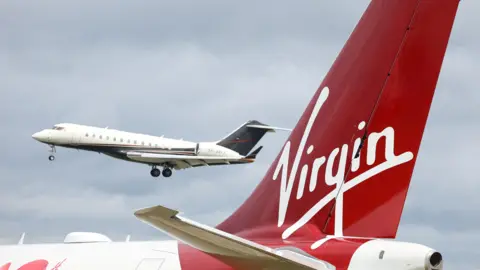 Reuters
Reuters
Virgin Atlantic has bought seven new long-haul jets
Behind the scenes, the Airbus sales team has been busy, signing orders for 139 new aircraft.
Virgin Atlantic bought seven new widebody A330 aircraft, with a list price of around $800m (£620m).
Another big order came from Japan Airlines for 20 long haul A350-900 jets, and 11 single aisle A321neo planes, worth just over $3bn (£2.3bn).
To any normal industry, these would be huge numbers.
But aviation is a one-off. The market is dominated by Airbus and Boeing, who sell the vast majority of big passenger jets the world over.
And they like doing it in style at the big airshows.
The Airbus deal with Virgin was actually signed on board a brand new A330 jet, painted in Virgin colours and named “Ruby Rebel”, in a nod to Virgin founder Sir Richard Branson.

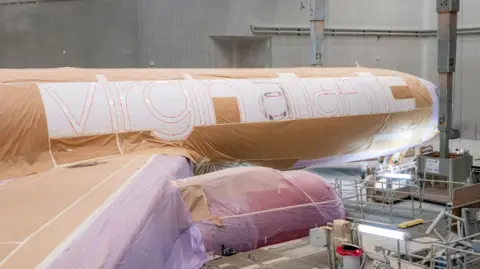 Airbus
Airbus
An Airbus A330neo being painted with Virgin colours
Yet this has actually been a fairly quiet year for deals at Farnborough.
In 2018, the last show before the pandemic grounded the world’s airlines, Airbus racked up a total of 431 firm orders and commitments. This year, that figure is just 139.
Why? Because at the moment selling planes looks a lot easier than making them.
Airbus boss Guillaume Faury was candid that his suppliers are often late delivering vital components.
He said: “We have thousands of suppliers, and when you have just a couple of them that are late on the ramp-up, that’s slowing down everybody.”

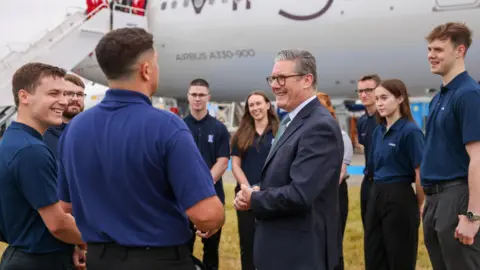 EPA
EPA
Airbus apprentices met Sir Keir Starmer, the Prime Minister, by one of the aircraft the company has been selling at the show
The company now has a backlog of 8,585 jets that have been ordered but not yet manufactured.
To give an idea of the scale of that queue, last year Airbus made and delivered 735 planes.
Order one of the sparkling new A321 fuel efficient jets for £90m, and you will have to wait until 2031 at least to fly it.
"We are focussing our efforts on those bottlenecks," said Mr Faury.
While the sales teams are in the spotlight this week, it is Airbus engineers and production managers facing the biggest challenges. They are trying to speed up manufacturing of these hugely complex aircraft, relying on hundreds of specialist suppliers who face their own problems.
"We are sending our own people," said Mr Faury.
"Trying to provide help, anticipate the situation. And we have increased our buffer stocks to react to a crisis in the supply chain."

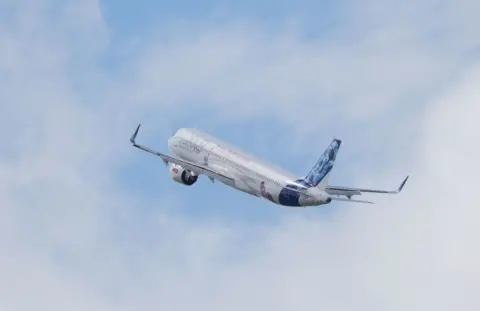 Airbus
Airbus
The A321 "extra long range" single aisle plane has proved popular with airlines
On the last day of the show, some aviation executives showed their patience, allowing Airbus to end on a high.
Low-cost Saudi airline, ‘flynas’, signed a provisional deal to buy 90 new aircraft, worth around $12bn.
The man buying the planes, flynas CEO Bander Almohanna, explained that the 75 A320neo aircraft he had just ordered had “exceptional efficiency”, which is vital for a low cost airline.

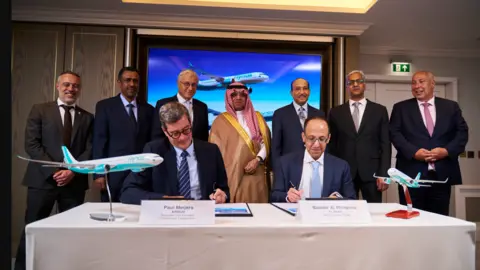 Airbus
Airbus
Saudi airline 'flynas' has bought 90 new Airbus jets at the Farnborough Air Show
The other 15 planes are the long haul A330neo, which the airline says will “support our growth plans and Saudi Arabia’s pilgrim program."
In Filton, just north of Bristol, around 4,000 people work for Airbus and its partner GKN, designing and making wings.
They will have cheered the news that Airbus finally won the annual tussle with their big rival Boeing, selling 21 more aircraft than the Americans.
But it also means that in four days at Farnborough, another 139 planes have been added to their 'to do' list.
More aerospace stories on the BBC

 9 months ago
30
9 months ago
30
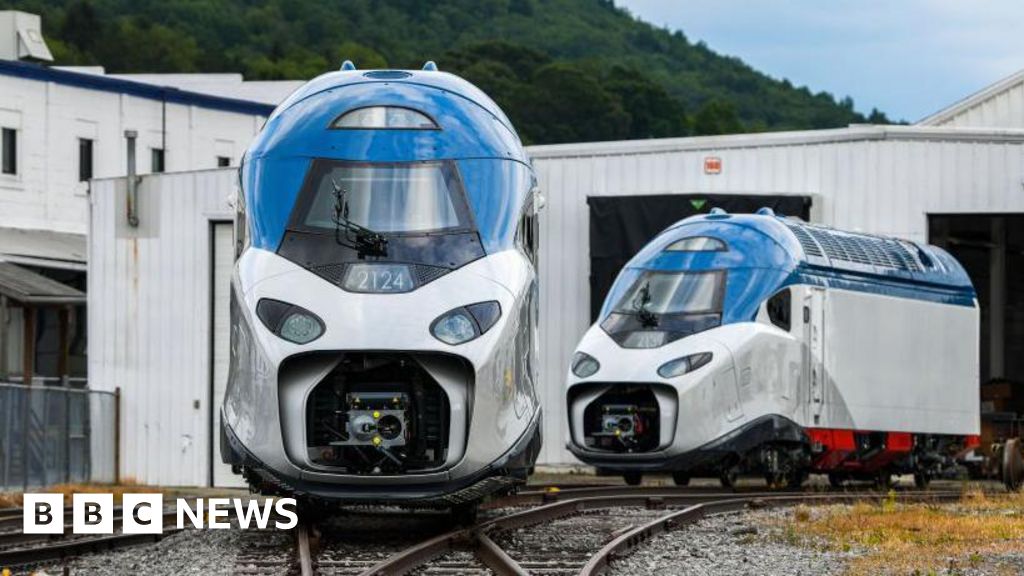

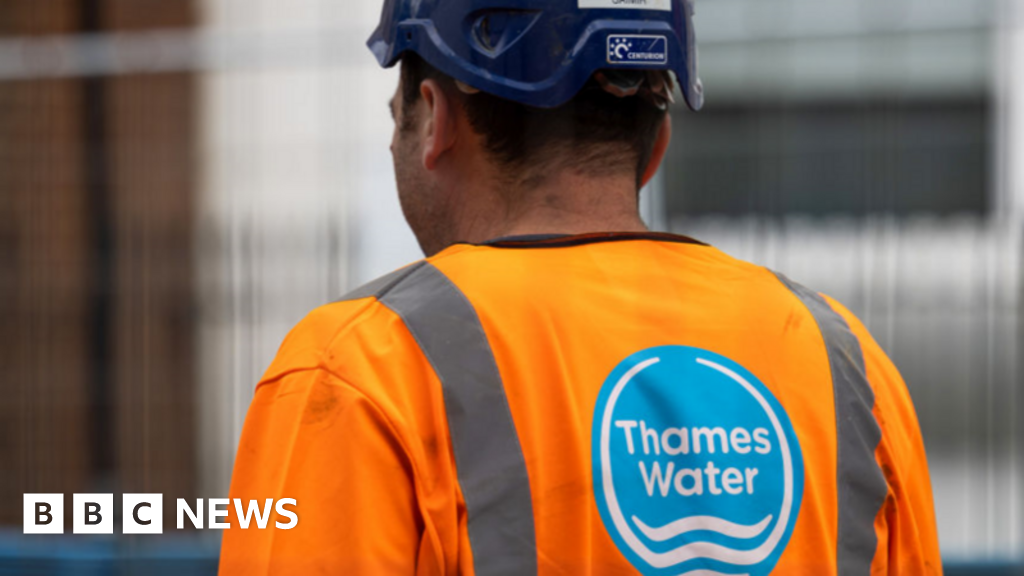





 English (US) ·
English (US) ·